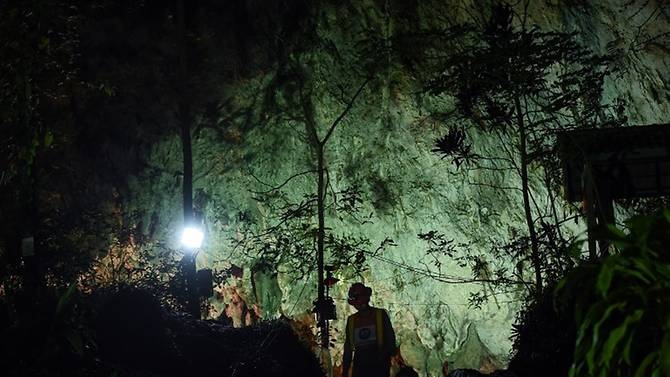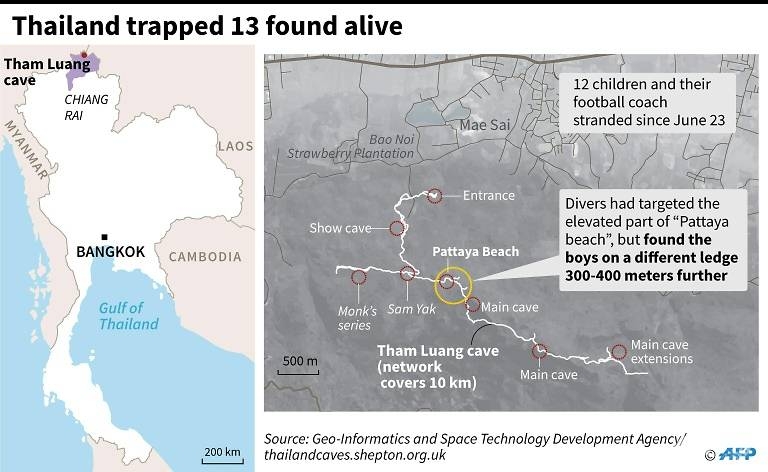Thai boys survived by drinking water from stalactite formations in cave: Doctor
 |
| A Thai technician emerges from the mouth of Tham Luang cave, at the Khun Nam Nang Non Forest Park in Chiang Rai province on Jul 2, 2018, as the rescue operation continues for a missing children's football team and their coach. (Photo: AFP/Lilian Suwarumpha) |
These details emerged on Tuesday (Jul 3) as rescuers thrashed out plans to extract the boys and their 25-year-old coach. The group were located by divers late on Monday night, nine days after they first went missing.
A stalactite is an icicle-shaped formation found hanging from the ceiling of caves. It is produced by the precipitation of minerals from water dripping through the cave ceiling.
Seven members of a Thai navy SEALS unit, including a medic and a counsellor, are staying with the group after their discovery on an elevated rock late by divers who had struggled for hours through narrow passages and murky waters.
News of the survival of the "Wild Boar" team sparked jubilation in a nation gripped by the harrowing drama, with news websites, social media and the prime minister celebrating the event and hailing the rescuers as heroes.
"Thank you all Thais, thank you all foreigners, everybody is a hero and everybody helped each other," Prime Minister Prayuth Chan-ocha told reporters.
PLAN A, PLAN B
Aged between 11 and 16, the boys and their coach went missing on Jun 23, after they set out to explore the caves in a forest park following a training session.
Much-needed food and medical supplies - including high-calorie gels and paracetamol - reached them Tuesday as rescuers prepared for the possibility that they may be there for some time.
Rescuers told reporters that a first meal of pork and sticky rice was being prepared for the boys, The Guardian said.
Rear Admiral Apakorn Yuukongkaew, commander of the SEALS unit, said rain was still a challenge but the boys would be taken out safely as soon as sufficient water could be pumped out of the cave.
"But if that doesn't work, with the seasonal rain, we'll do it another way," he told reporters.
"We have Plan 'A' and Plan 'B', and ultimately, everyone will return to their parents' embrace."
The 13 have been given a gel with high calorie and mineral content to sustain them while rescue plans are worked out.
Officials declined to say what plans 'A' and 'B' were, but said they aimed to bring the boys out the same way they had entered.
Options included teaching the group to use smaller diving apparatus and guiding them out of the caves, from which 120 million litres of water had been pumped continuously for 75 hours by Tuesday evening.
NEED HOPE, EXERCISE TO SURVIVE CAVE ORDEAL
The 13 are also fighting threats to their health ranging from muscle degeneration and malnutrition to possible infection, said experts.
However, the group's survival may ultimately hinge on mental rather than physical toughness - not losing hope while rescuers figure out how to free them from the dark, wet cavern, a process that could take weeks or even months.
"The mental side of this has to be one of the top considerations," said Andrew Watson, an experienced rescuer of mineworkers trapped by floods or fire.
"The uncertainty of when and how they might be rescued will be beginning to set in," Neil Greenberg, an expert in post-traumatic stress disorder at King's College London told AFP.
"When the divers got through, the kids, the thought process (would have been): 'They get in, why can't I get out?'" added Watson, commercial director at the Mines Rescue Service UK.
"It depends now how they're communicating the circumstances to the children ... You have to tell them just exactly what the circumstances are because ... they need to understand that this is a difficult process that will require patience. Possibly a lot of patience."
SPACE, SANITATION
Physically, the priority is to nourish and rehydrate the group and rebuild lost strength.
For Mike Tipton of the University of Portsmouth the fact that the footballers endured in the cave for nine days implied that three key ingredients for survival were in place: oxygen, a tolerable temperature, drinkable water.
Next to consider: "Things like what's the sanitation like? Are they disciplined in order that they don't get outbreaks of disease? That could be the next ... threat," said Tipton, an expert in the effects of extreme environments on the human body.
Once the group starts eating again, they will need safe sanitation to ensure waste is washed away and doesn't pollute their drinking water.
The floodwater itself may also be contaminated with sewage or dead animals, Tipton pointed out.
A further concern: "How much space do they have?"
Being confined and sedentary for an extended period can result in muscle atrophy, or wastage, which can cause temporary muscular and skeletal problems.
The weaker the children are, the more difficult they will find a dive to freedom, said the experts.
"It is going to be a very, very major decision," according to Watson, who judges it "far safer" to wait for the water to clear, if at all possible.
STAY OR SWIM?
"We have to bear in mind these are children," he stressed. "You are talking about water: it's going to be moving, there's going to be pressure, there's going to be resistance, it's not going to be clear, and they've no experience of the breathing apparatus."
Just one individual panicking in the water could have a disastrous ripple effect.
If conditions allow the group to stay in the cave, it will be important for them to keep busy, focused and positive, said Tipton.
A good leader can turn the experience into "an adventure as opposed to a challenge".
 |
| Map of Thailand locating a cave where school children have been trapped since June 23. AFP/Laurence CHU |
Once communications are established, the children's parents must keep their cool, added the experts.
"Anxiety expressed by their families could easily erode a child's resilience," warned Greenberg.
"A positive 'it'll be just fine' approach may be an effective way of allaying their fears."
Jean-Noel Dubois, a French spelunking rescuer and medic, said group cohesion has been shown to help pull people through situations like these.
"They are together," he said of the stranded footballers. "What people tell us after an underground rescue is that it is easier to persevere if one is part of a group and one has hope."
What the stars mean:
★ Poor ★ ★ Promising ★★★ Good ★★★★ Very good ★★★★★ Exceptional
 Tag:
Tag:
Related Contents
Latest News
More News
- Russian President congratulates Vietnamese Party leader during phone talks (January 25, 2026 | 09:58)
- Worldwide congratulations underscore confidence in Vietnam’s 14th Party Congress (January 23, 2026 | 09:02)
- Political parties, organisations, int’l friends send congratulations to 14th National Party Congress (January 22, 2026 | 09:33)
- 14th National Party Congress: Japanese media highlight Vietnam’s growth targets (January 21, 2026 | 09:46)
- 14th National Party Congress: Driving force for Vietnam to continue renewal, innovation, breakthroughs (January 21, 2026 | 09:42)
- Vietnam remains spiritual support for progressive forces: Colombian party leader (January 21, 2026 | 08:00)
- Int'l media provides large coverage of 14th National Party Congress's first working day (January 20, 2026 | 09:09)
- Vietnamese firms win top honours at ASEAN Digital Awards (January 16, 2026 | 16:45)
- ASEAN Digital Ministers' Meeting opens in Hanoi (January 15, 2026 | 15:33)
- ASEAN economies move up the global chip value chain (December 09, 2025 | 13:32)






















 Mobile Version
Mobile Version